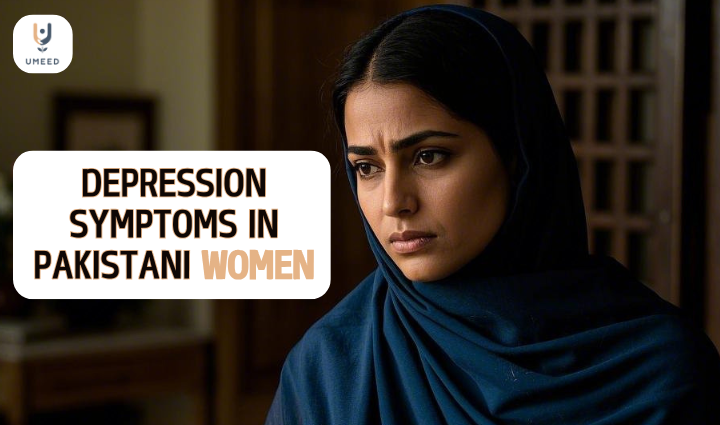
How to Identify Depression Symptoms in Pakistani Women
- March 14, 2025
- 0 Likes
- 7161 Views
- 0 Comments
Depression is a common mental health issue that affects millions of people around the world, and Pakistani women are no exception. In Pakistan, many women face extra challenges like cultural expectations, social pressures, and economic struggles that make depression even harder to deal with. Unfortunately, mental health issues are often not talked about in Pakistan, especially when it comes to women.
This article will discuss the common symptoms of depression in Pakistani women, its causes, and the treatment options available to help women who are struggling with this mental health condition.
1. Understanding Depression in Pakistani Women
What Is Depression?
Depression is more than just feeling sad—it’s a serious condition that affects how a person feels, thinks, and acts. For Pakistani women, depression often involves dealing with many challenges that are unique to their culture, like the pressure to always appear strong and the expectations to take care of others before themselves.
The Stigma Around Mental Health
In Pakistan, mental health problems are often seen as shameful or something that should be hidden. This stigma prevents many women from seeking the help they need. The fear of being judged makes it harder to talk about depression openly, and many women suffer in silence.
How Common Is Depression?
Depression is common in Pakistan, especially among women. However, most women do not get treatment because of the stigma or because they do not know where to turn for help.
2. Common Depression Symptoms in Pakistani Women
Depression can show up in many different ways. Some common symptoms of depression in Pakistani women include:
- Persistent Sadness or Hopelessness: Feeling empty or like there is no way out of your problems.
- Loss of Interest in Things You Enjoy: Losing interest in activities, even those that once brought joy.
- Sleep Problems: Either not being able to sleep at night (insomnia) or sleeping too much.
- Changes in Appetite or Weight: Either eating too little or too much, leading to weight loss or gain.
- Lack of Energy: Feeling tired all the time, even after resting.
- Difficulty Concentrating: Struggling to focus on everyday tasks or make decisions.
- Suicidal Thoughts: Feeling like life isn’t worth living or thinking about harming yourself.
Many of these symptoms can be misunderstood or ignored because of cultural norms. Pakistani women may feel pressure to hide their struggles and continue taking care of others, which means their symptoms can go unnoticed.
3. Causes of Depression in Pakistani Women
Several factors can contribute to depression in Pakistani women, including:
Cultural Pressures
Pakistani women are often expected to fulfill traditional roles in the family. They must be good wives, mothers, and daughters, which can be overwhelming. These expectations can cause a lot of stress and emotional exhaustion.
Economic Struggles
Many women in Pakistan depend on their husbands or male relatives for financial support. Lack of job opportunities and financial independence can make women feel trapped and helpless, leading to depression.
Gender Inequality
Pakistani society is still largely patriarchal, and women often face discrimination. They may not have the same rights as men in areas like education, employment, or even within their own homes. This constant inequality can harm a woman’s mental health.
Limited Access to Education and Healthcare
Many women, especially in rural areas, have limited access to education and healthcare. Without proper support, it’s difficult for women to improve their lives or get the help they need for depression.
Health Problems
Chronic illnesses, pregnancy, or hormonal imbalances (like postpartum depression) can also trigger depression. Without the right care, these issues can become overwhelming.
4. Domestic Violence and Depression Among Pakistani Women
Domestic violence is a major factor in the depression of Pakistani women. Physical, emotional, and verbal abuse is common, yet it’s often ignored or hidden due to cultural shame and fear. Abuse can leave deep emotional scars that lead to depression, anxiety, and even suicidal thoughts.
Lack of Protection
In Pakistan, women often lack legal protection from domestic violence. Many don’t report abuse because they fear being blamed or ostracized. This makes it even harder for them to get the help they need.
5. How Depression Affects Women in Pakistan
Untreated depression affects every area of a woman’s life:
- Family Life: Depression can put a strain on marriages and make it difficult for women to care for their children. It can create emotional distance and isolation.
- Work and Education: Women who suffer from depression may find it hard to study or hold a job, which affects their financial independence and personal growth.
- Physical Health: Depression is linked to health problems like heart disease and diabetes. When depression isn’t treated, it can lead to serious physical issues.
- Overall Well-being: Untreated depression can lead to more serious mental health problems, such as anxiety or psychosis.
6. Treatment Options for Depression in Women in Pakistan
There are several treatment options available to help Pakistani women manage depression:
Medical Treatments
- Antidepressants: Medications can help balance the chemicals in the brain that affect mood.
- Therapy and Counseling: Talking to a therapist can help women address their thoughts and feelings and learn how to cope with depression.
Cultural Barriers
There is still a lot of stigma surrounding mental health, which stops many women from seeking professional help. But it’s important to break these cultural barriers and encourage women to seek care when they need it.
Alternative Treatments
Some women may use herbal remedies or spiritual healing, but it’s important to remember that these should not replace medical treatments. They can be helpful when used alongside therapy.
Self-Care
Taking care of your body and mind can also help manage depression. Simple practices like regular exercise, eating healthy, and practicing mindfulness can improve mental health.
Getting Help
If you or someone you know is struggling with depression, seeking help is critical. Umeed offers online counseling and support to Pakistani women who need help but may not be able to access traditional healthcare. You don’t have to face depression alone professional help is just a click away.
Final Thoughts
Depression in Pakistani women is a serious issue that requires urgent attention. By understanding the symptoms, causes, and treatment options for depression, we can create a more supportive environment for women. It’s time to stop the silence and stigma surrounding mental health and provide women with the help they need to recover and thrive.
